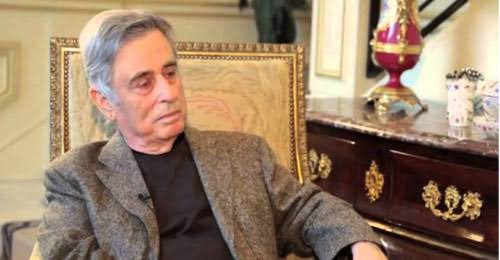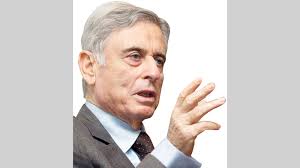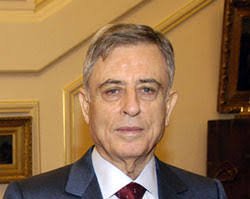Abdel-Halim Khaddam, the former Vice President of Syria, stated in an interview with the radio station “Voice of Russia” that he has no intention of heading the potential transitional government in Syria. He emphasized that he announced since his defection that he relinquished power.
Here is the full text of the interview:
Q: Mr. Abdel-Halim Khaddam, for the first time in years, you are meeting with a high-level Russian diplomat. In your opinion, what is the significance of such contacts? Why haven’t they happened before?
A: “They haven’t happened before” is not related to me. It is related to the Russian side. But I believe, in these difficult circumstances in the Middle East, especially in Syria, such meetings are important to discuss the crisis and the suffering of the Syrian people, facing killings and destruction.
Q: In your opinion, does Russia play a significant role in solving this crisis?
A: This depends on the Russian stance. Therefore, I cannot judge until after the meeting and understanding the true dimensions of Russian policy. I don’t want to evaluate this policy through the media but through discussions with the Russian side. Through these discussions, the stance can be evaluated accurately and objectively.
Q: Mr. Abdel-Halim Khaddam, you left Syria more than seven years ago. There are even rumors that there was a conspiracy, as if you were one of its founders. Are these rumors true? Why did you leave the country when you were previously the Vice President of Syria, a very high position?
A: I left Syria and declared my defection from the regime because my conscience could no longer bear the crimes, corruption, and tyranny committed in Syria. Therefore, I announced my defection and became part of the opposition outside the country, which has extensions inside the country.
Q: Can you draw a comparison between the Syrian President, the father (Hafez al-Assad), with whom you worked, and the current Syrian President, his son Bashar al-Assad? Is there a significant difference in their personalities, and what are your personal impressions from dealing with President Bashar al-Assad?
A: What unites the two individuals is their leadership of a dictatorial regime. Both are dictators. The difference between the father and the son is that the father did not make decisions without studying them thoroughly. The son, on the other hand, rushes to make decisions. Thus, he turned Syria into a sea of blood, destroying almost everything the Syrians built over more than seventy years after gaining independence.
Q: This is now during the crisis, but what is your assessment of President Bashar al-Assad’s policy before that, the attempts at reform, and so on? Why, in your opinion, did he not succeed?
A: He did not succeed because he did not want reform. If he wanted reform, we tried to help him a lot. We presented several studies and projects for reform, but he promised implementation and still retreated. He promises in the morning and retreats in the evening. He is a man characterized by reactive behavior, irrationality, and a lack of reason and logic in every decision he makes.
Q: Mr. Khaddam, some say that you could lead the transitional government in Syria, while others suggest that Mr. Tlass, the son, could play this role. What is your response to these proposals?
A: For me, this is not possible.
Q: Why?
A: Because I announced since my defection that I left the authority. As for Manaf Tlass, I believe this is not possible and not practical. His defection from the regime was recent. Therefore, the situation inside cannot bear such a choice for defection at a time when he spent more than a year and a half under a regime practicing all kinds of killing. Of course, we welcomed and welcome the defection of any official. We welcomed Mr. Tlass’s defection, and I believe he is not considering such a move.
Q: Here you differ with Michel Kilo. He told me once that Manaf Tlass could run for this role!
A: Michel Kilo is an old activist, but apparently, he does not fully understand the political climate of the Syrian people.
Q: Mr. Khaddam, what is the solution in your opinion now? What can happen in Syria soon? What is your vision? Russia proposes dialogue between conflicting parties. Still, some countries believe this is almost impossible, and there might be a military solution, direct intervention by foreign forces, or indirect intervention by supporting the Syrian opposition, etc.
A: The Syrian people are being slaughtered every day, with hundreds killed under the watchful eyes of the international community. Therefore, the Syrian people have the right to explore all means to defend themselves and overthrow this regime by all available means. Whether these means involve international intervention or internal exhaustion. The Syrian people have paid tens of thousands of martyrs and hundreds of thousands of wounded so far. Cities and neighborhoods in cities have been destroyed. Entire villages have been destroyed. How can we imagine that there is a political solution possible in the continued presence of this regime?
Q: What action to take?
A: The action is to continue the struggle until the overthrow of this regime. The countries that realize the danger of this situation should take measures to isolate this regime, thus stopping its capabilities for killing and destruction.
Q: Do you think that safe zones could be useful?
A: Safe zones have no meaning. Safe zones cannot be established because, first, if they are border areas, there is no border in the middle of the country to establish a safe zone. Second, safe zones mean more dispersion and more conflicts. Therefore, I do not believe that safe zones are a successful idea.
Q: So, what’s the bet on? You have significant experience in managing the country. The opposition cannot…?
A: The bet is on action. It is challenging for a person to come out in the media and say my bet is this and that, especially in a world, as you know, with diverse goals, varied conflicts, a tense world, a world that has lost the ability to respect human rights and the United Nations charter.
Q: Mr. Khaddam, you were the Vice President, and the late President Hafez al-Assad ruled the country for a long time. And you are from the Sunni Muslims. Does this prove that claims that Sunnis were persecuted in Syria are not true?
A: The entire Syrian people were persecuted. Most of the Syrian people were persecuted, not only Sunni Muslims, but there were other entities within the Syrian people that were also persecuted. Therefore, the issue is not sectarian; it is a purely national matter. Because this regime destroyed Syria, and therefore, we must save the Syrian nation with all its components.
Q: But in Russia, the Russian leadership says that there are many risks if the Assad regime falls. In Russia, they fear that there might be massacres between Sunnis and Alawites, etc.?
A: First, there will be no sectarian massacres. There will be no massacres if the regime falls. The Syrian people are a nationalistic people, a people keen on their national unity. The revolution does not hold grudges or seek revenge. The revolution holds accountable. Therefore, there is no concern. Additionally, if Russia is concerned about minorities, why not be concerned about the majority that is being slaughtered daily? Why? Is it not the right of the majority to live? To decide the fate of the country. To live in security and stability. To find opportunities for a decent life. Can any people accept that the majority is oppressed and unjustly treated for the sake of some adventurers in this minority or that?
Q: Mr. Khaddam, what is your opinion on the mission of Lakhdar Brahimi? Can he succeed?
A: He says his mission is almost impossible. And indeed, he will not succeed. His mission will be the same fate as Kofi Annan’s mission.
Q: Mr. Former Vice President, when I was preparing for this interview, I saw on the internet that you once spoke to an Israeli TV. Is this true?
A: I did not speak to an Israeli TV. I spoke to a Spanish TV. And it turned out that some of the committee conducting the interview belonged to the Jewish community.
Q: But what is your opinion on the possibility of resolving the crisis between Syria and Israel? The Golan Heights, etc. Is this matter currently being postponed due to the ongoing crisis in Syria?
A: The issue of the Golan Heights is a national issue. It is an essential part of the national issue. It is a national goal for all Syrians. Therefore, we do not want to link this matter to that. This matter is different, its circumstances are different, and its elements are different.
Q: You must be aware of the size of the chemical weapons in Syria since you held the position of Vice President, and you had all the files in your hands. Do these weapons indeed pose a threat, and is their scale significant?
A: Firstly, I did not have all the files at my disposal. I was responsible for foreign policy only. I was not responsible for security or internal policy. Everything I was informed about in internal policy was through my membership in the party’s leadership. Matters of delicate secrecy were not discussed in the leadership’s meetings or its institutions. Certainly, chemical weapons are dangerous in every country. Every country possessing chemical weapons poses a threat to itself and to others. Therefore, we have always called for the mandatory destruction of all chemical weapons, not only in the Middle East but in the entire world.
Q: But for Syria, you must have known something about this issue, right?
A: There is, of course, talk that there are actions to acquire, establish, or produce chemical materials. This is a well-known matter, not a secret to anyone. But how, by whom, and from where? No one knows that except the head of state and the supreme security leadership.
Q: In your opinion, can Bashar al-Assad use these weapons?
A: He uses something worse than chemical weapons. He uses mass murder. He uses airplanes, missiles, artillery; he uses all means of killing. So, what is the difference between mass murder with chemical weapons and mass murder with conventional weapons? It is more than traditional.
Q: Mr. Khaddam, King Abdullah of Jordan once said recently that President Bashar al-Assad could go to the Alawite areas on the coast and in the mountains. And if he loses control over all of Syria, there might be a small Alawite state.
A: There will never be an Alawite state. Not an inch of Syrian land will be divided. The Syrian people, who are fighting with their blood for their national unity and for a democratic civil system, will never accept it. They will pursue anyone who tries to dismantle Syria until they reach their graves.
Q: Finally, Mr. Khaddam, what is required from Russia overall?
A: Russia is required to reconsider its historical relations with Syria. The historical relations between the Syrian people and Russia were strong and built on solid foundations. We hope that the Russian government will reconsider its policy to restore Syrian-Russian relations to their natural place desired by the Syrians and also, I believe, by Russian citizens.
Q: Who could lead the transitional government in Syria?
A: It is premature to talk about that. We have not reached the stage of forming a transitional government yet. When that stage comes, there will be a Syrian national agreement to form a transitional national government.
Q: The former President Hafez al-Assad, whom you knew, did he fear what is happening now in Syria? Did he foresee the possibility of it happening or not?
A: A dictator sees his reality but does not see the future. If Hafez al-Assad realized what was happening in Syria, he would not have involved himself in bequeathing power to his son. He should have left the fate of the Syrian people and the system of governance to the Syrian people. Because the governance during Hafez al-Assad’s time or during his son’s time was dictatorial, suppressing freedoms and persecuting citizens. The difference between them is that one of them made decisions after internal and external calculations, and the other makes decisions without any calculations or concern for the interests of the people. He threw himself into the unknown without anyone knowing where its waves would throw him.



